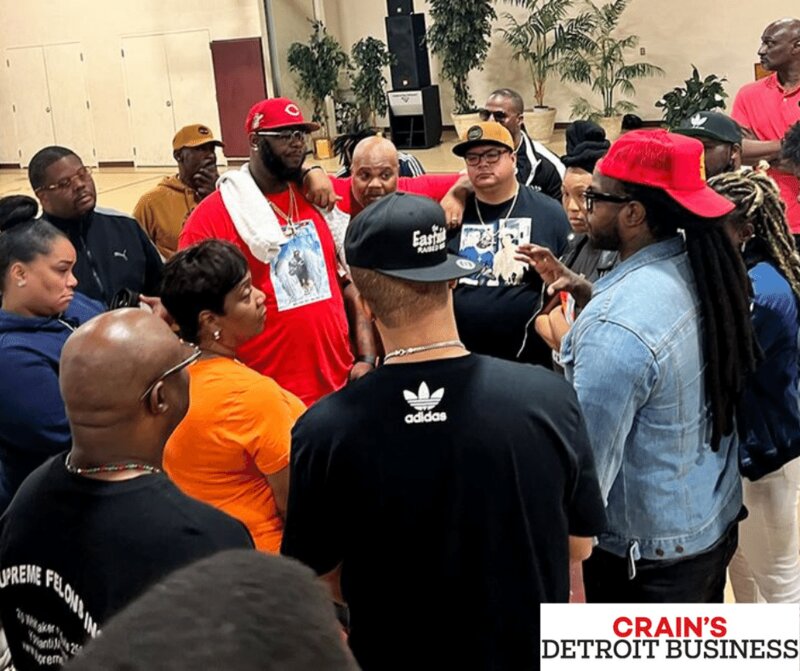Detroit has been funding community violence intervention work done through city-run programs since 2012. It’s provided nearly $3.9 million in general fund dollars to the work over that period, including $775,000 for the current fiscal year, said Corey McIsaac, deputy director of media relations for the mayor’s office.
Over the same period, the city has leveraged $520,000 in private foundation support for the city-run program and $2.2 million in federal grants.
Separately, the Detroit Employment Solutions Corp. recently made a $400,000 grant to Detroit Friends and Family, funded by the Hudson-Webber Foundation, McIsaac said.
Detroit was awarded nearly $826.7 million in ARPA funding, three-quarters of which has since been committed to projects that have bids in process or upcoming, according to the city’s website. It is required to award the funds by Dec. 31, 2024 and see them spent by the end of calendar 2026.
The city is “absolutely” considering ARPA investment in community violence prevention and working on a detailed plan to do so, Bettison said, noting it will make recommendations to the city council once it builds out the plan. He gave no hints on when that might be.
“We’re working at a fast pace …to be able to get this done.”
Winans said resident and community groups are increasingly frustrated with the amount of time it’s taking to secure public funding.
“The police got a job to do, but they’re funded. The government is funded… it’s the neighborhood-based organizations where the people are most impacted that appear right now to be least supported,” he said.
Winans said his group and Force Detroit are talking with the city about ARPA funding and the infrastructure that needs to be in place to receive the funding.
“They’ve provided hopeful responses,” he said, “but right now, the hopeful response doesn’t save a life.”
The time it’s taking for public appropriations to community violence intervention work is also putting a strain on the people and groups doing the work, Winans said. Residents who’ve seen media reports on promised CVI funding coming are questioning the credibility of community groups, he said.
“When I have a young man telling me he’s considering hurting someone else in order to put food on his table, I have to take an overdraft on my account in order to help him,” said Winans. “We’re the ones whose phone numbers they have. They’re asking, ‘where’s the money?'”
At the state level, Governor Gretchen Whitmer in November put forth a proposal for $30 million in community violence intervention statewide, as part of the $75 million MI Safe Communities framework.
The funding, which would be used to reduce violence in communities across Michigan by establishing a range of community violence prevention initiatives informed by data and best practices used nationwide, will be negotiated with the legislature as part of the budget process for next year, the governor’s director of communications Bobby Leddy said in an email.
The Biden administration proposed more than $5 billion in funding for the federal Community Violence Intervention Collaborative efforts in the 16 cities. But the “Build Back Better” bill in which it was included did not pass the Senate. But guidance from the government permits ARPA dollars to be used for community violence intervention aligned with areas like workforce development and improvements in neighborhoods.
“Our hope is that every major civic mayor, including Detroit’s, allocates a portion of their ARPA and other public moneys to support local, community-based safety organizations,” said Alyssa Cass, a spokesperson for the CVIC initiative.
Strengthening the framework
In addition to providing scenario-based training and operational support for community groups working on violence intervention and technical assistance to strengthen their organizational capacity, the federal CVIC initiative is also designed to help groups working on community violence pull down bridge funding from contributed philanthropic dollars while cities make ARPA allocations to CVI work, a spokesperson for the CVIC initiative said.
Private funders that have come forward with support for local and national community violence intervention work include Ballmer Group, Hudson-Webber Foundation, Kresge Foundation Skillman Foundation and W.K. Kellogg Foundation.
Foundations are working closely with local CVI groups to make sure that they have access to general operating support and other programmatic dollars, “but the real intent of the White House initiative is to ensure that the cities use their federal dollars to support the ongoing efforts of organizations like Force Detroit and Detroit Friends and Family, Ceasefire and others,” Jackson said.
The CVIC initiative is also providing technical assistance to the cities to ensure that they look at how to best allocate the federal resources, she said.
“Philanthropy cannot do this alone. And so the importance of the federal dollars is quite critical.”
Community-led violence intervention has been proven to be effective and lasting, as opposed to locking people up, said Melanca Clark, president and CEO of the Detroit-based Hudson-Webber Foundation.
“Philanthropy is watching closely what’s happening here, and I think that there are a number of us that want to be supportive and already have been with support for community violence intervention,” she said.
“But the truth is, whatever we can do collectively is just to help leverage what should be the more substantial investment from the public sector. And that should be an enduring investment that lasts beyond ARPA.”


